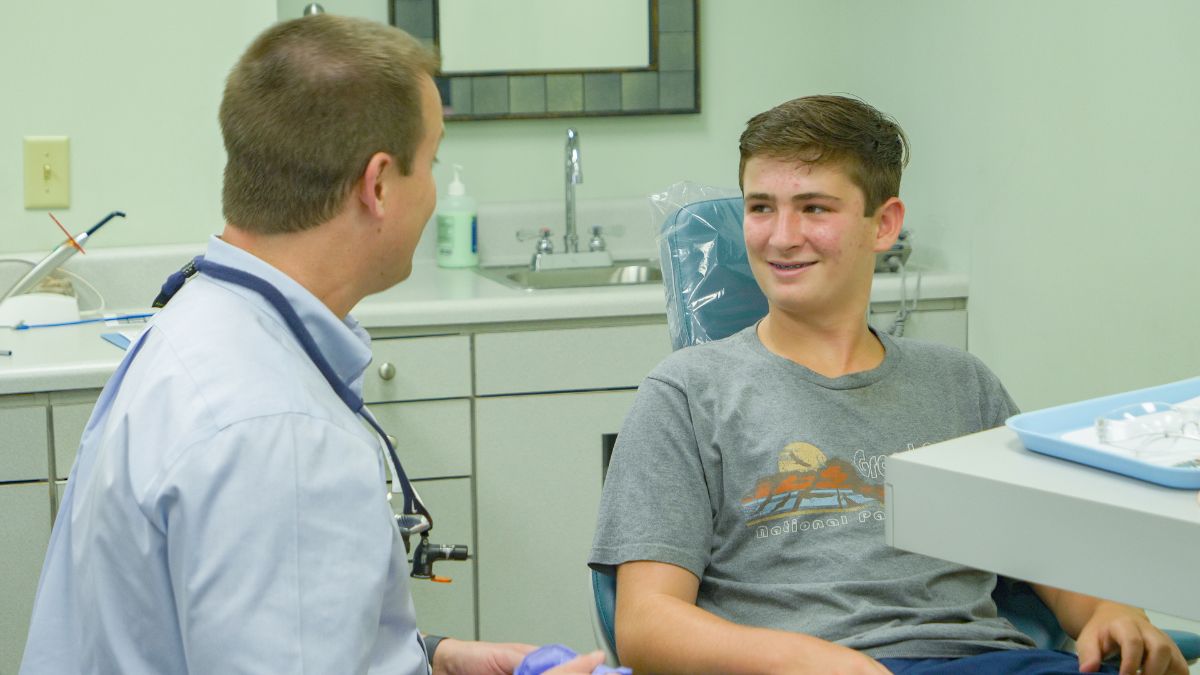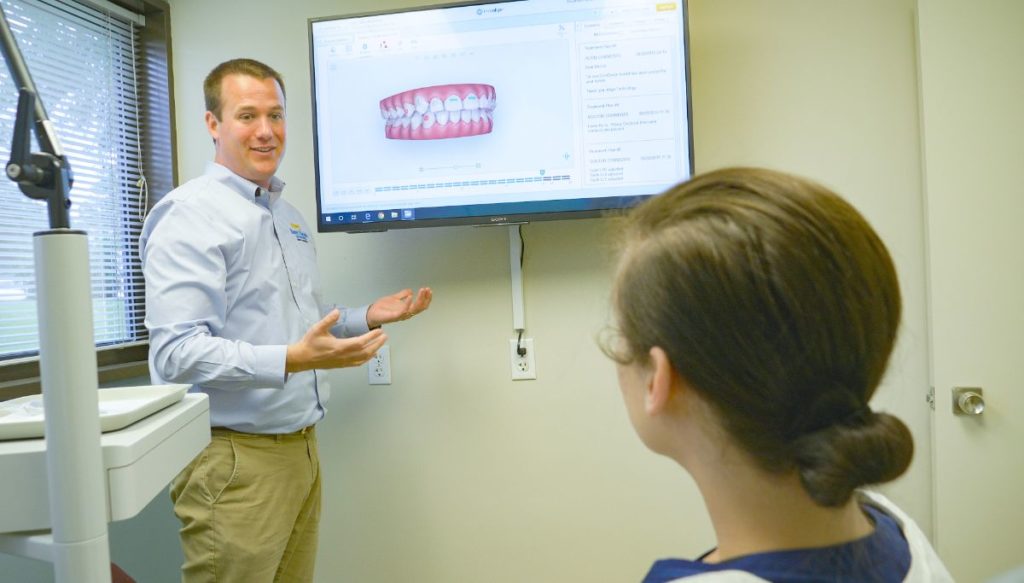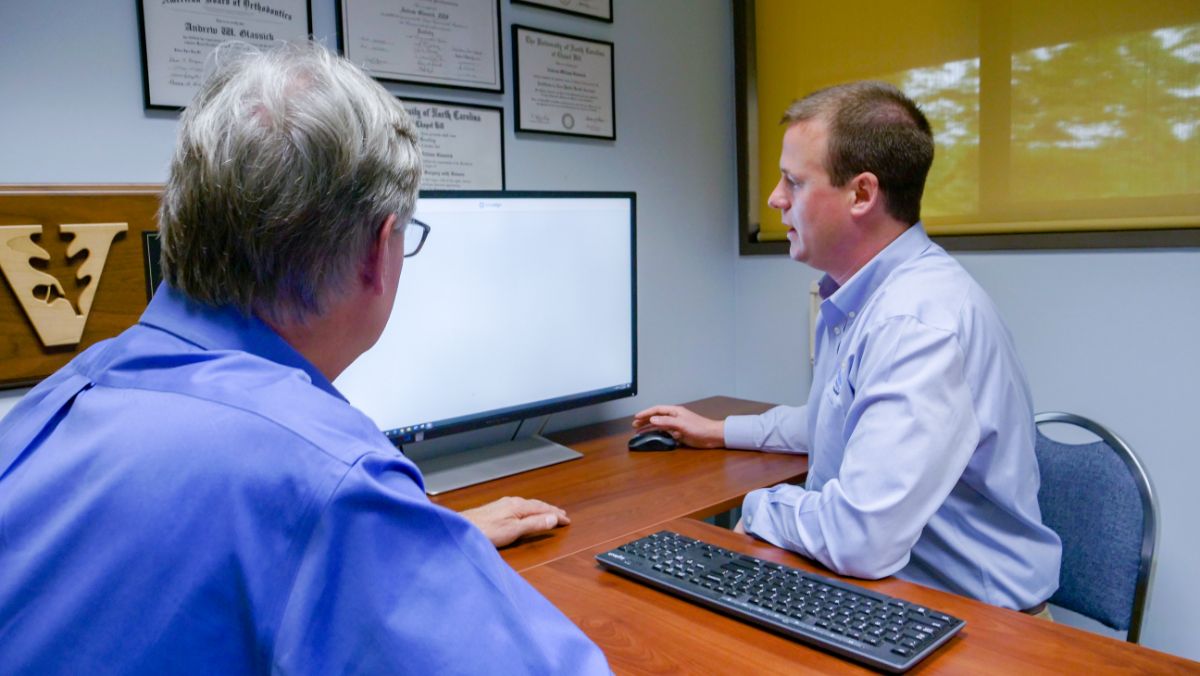If you’re a current orthodontic patient, seeing so many mandated closures, stay-at-home orders, and ever-changing guidelines happening all across the country may have you feeling confused and worried about how this will affect your treatment. Fortunately, there are still several things you can do from home to maintain your smile during this time! Let’s explore a few of the ways you can keep up with maintaining your orthodontic treatment plan from home while our office is closed.
Brush up on dental hygiene basics
Oral hygiene should be a priority for all of us, but it’s especially important if you’re undergoing orthodontic treatment. A healthy mouth is necessary to successfully straighten your smile! Failure to care for your teeth and gums while you’re in braces or aligners may lengthen your total treatment time, so this is an excellent time to perfect your technique.
The first step in any dental hygiene routine should be effective brushing. Start with the outer surfaces, angling your brush towards the gum line. If you wear braces, pay special attention to the areas between the brackets and gums since it’s easy for food particles to get stuck there. Carefully clean between the wires and teeth, too! If you’re finding it difficult to get into these hard to reach areas effectively, try using an interdental brush or waterpik to help remove stubborn plaque and food particles.
Be sure to clean the outer, inner, and chewing surfaces of all your teeth! We recommend brushing at least twice a day with fluoride toothpaste, for at least two minutes each time. For the best results, brush after every meal and before you go to bed each night.
Don’t forget about flossing! This is an equally important part of maintaining oral health. If you’re having trouble managing it with braces, threaders or waterpiks can be useful. Just remember that these are designed to be supplemental tools, and shouldn’t take the place of a regular brushing and flossing routine.
Stick to braces-safe foods
Although food restrictions can be frustrating for braces patients, they’re in place for good reason. Crunchy and chewy foods can wreak havoc on your braces by bending the brackets or warping the wires. They’re almost more likely to stick in the various nooks and crannies, giving plaque and bacteria a place to grow. Throughout treatment, you should avoid things like:
- chips
- ice
- gum
- some raw fruits and veggies
- popcorn
- caramel
- tough cuts of meat
- several types of candy
Additionally, you’ll want to break crusty bread into bite-sized pieces and remove corn from the cob before eating. Break bad habits now and keep pens, pencils, and fingernails out of your mouth, too.
As annoying as it can be to miss out on some of your favorite snacks and meals, this part won’t last forever! We’ll be removing your braces before you know it, and it will all be worth it as soon as you see your beautiful new smile.
How to treat non-emergencies from home
You may be surprised by how many minor orthodontic issues can be treated with a little know-how and a few items you probably already have lying around the house. These remedies can be very effective at lessening or relieving your symptoms entirely while you do your part to flatten the curve by staying home!
Mouth sores
While orthodontic treatment itself doesn’t cause mouth sores, some patients seem to be more susceptible to getting them while they’re in braces. If you’re dealing with a painful sore on your cheeks, lips, tongue, or gums, you can get some relief by swabbing a small amount of topical anesthetic directly to the sore.
Loose or broken brackets, bands, or wires
If any part of your braces comes loose or breaks during treatment, let us know as soon as possible so we can determine what your next steps should be. If a band or bracket is broken but still attached to the wire, try to leave it alone until you speak with us, and don’t connect any elastics to it during this time.
If any piece of your braces has completely broken off, place it in a secure bag and we’ll advise you on what to do. If you’re experiencing irritation, you can cover the component that’s bothering you with a small amount of orthodontic wax for relief.
Misplaced archwire, bracket, or tie
As treatment progresses and your teeth begin moving towards the desired positions, you may find the connecting them shifts as well. This may result in it poking out a bit near the back of your mouth, irritating your cheeks or gums. The eraser end of the pencil or a clean cotton swab can be used to gently move it back to where it’s supposed to be.
Likewise, wires or ties that have moved can often be gently manipulated back into place using a pair of clean tweezers or the eraser end of a pencil. A pinch of orthodontic wax over the parts that are poking out can help relieve the immediate discomfort, too.
Tooth pain or loosening
It’s natural for your teeth to loosen slightly during orthodontic treatment to accommodate the movements we want them to make. This can sometimes cause temporary tenderness or mild discomfort. Salt water rinses are a tried and true way to relieve oral soreness! Simply mix one teaspoon of salt in 8 ounces of warm water, then swish it around your mouth for about 30 seconds before spitting it out. A warm washcloth or heating pad placed on the outside of your jaw can offer some relief as well.
What about Invisalign patients?
Invisalign aligners are made of a clear thermoplastic material instead of brackets and wires, so they tend to be fairly low maintenance in general. While you’re unlikely to experience an orthodontic emergency if you’re an Invisalign patient, it’s still possible to break or lose an aligner! If this happens to you, be sure to contact our office so we can keep your treatment plan on track. In the meantime, continue to practice good dental hygiene and be sure to care for your aligners as well. Clean them gently each day and keep them in a case when they’re not in your mouth.
True orthodontic emergencies
Don’t hesitate to get in touch with us immediately if you’re experiencing a true orthodontic emergency! Even though our Charlottesville and Crozet offices are currently closed, Dr. Hamer and Dr. Glassick are still available to meet your needs. Our entire team is dedicated to providing you with a safe and stress-free orthodontic experience, even in these trying times.
Hamer & Glassick Orthodontics: we’re here for you
We hope this guide to caring for your smile from home is helpful! If you’re feeling worried about any aspect of your orthodontic treatment, we encourage you to reach out. We’ll be happy to answer questions or address any concerns through virtual visits, phone calls, or texts. This may be a period of adjustment for all of us, but you can count on us to keep a smile on your face!


